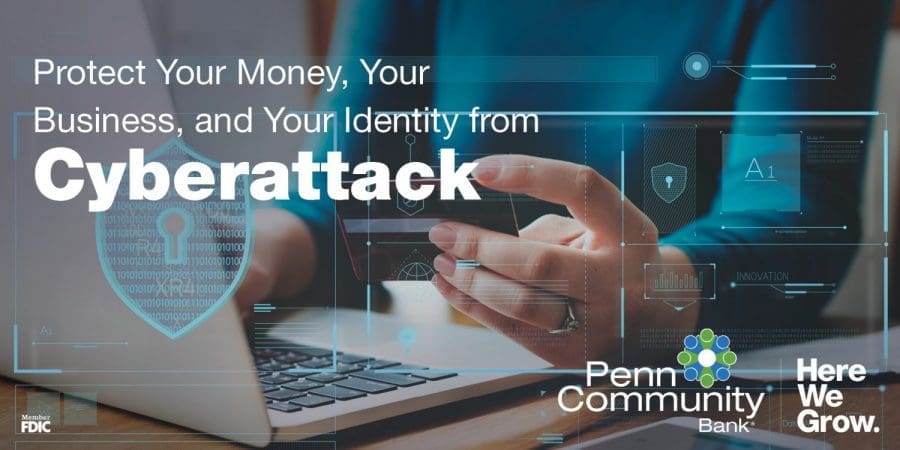
With every year that passes, Americans are spending more time online. The new and innovative technologies we are adopting—and are increasingly dependent upon—are by and large a good thing. By using the internet and the applications that interface with it, we can efficiently manage our money, do business, and stay connected. The internet consumer experience has become so effortless and quick that it is no wonder more banking, shopping, and business is done over the internet today than ever before.
Penn Community Bank is dedicated to vigilantly defending itself and its customers against cybercrime. Knowledge of safe online practices and a degree of alertness are all you need to protect your funds and your privacy from would-be cybercriminals.
Staying Secure at Home
There are many ways cybercriminals might attempt to access your personal information, but there are also many ways you can thwart them. Use the following tips to ensure your online safety while using your mobile phone and your devices at home.
- Be aware of the tactics criminals use. Phishing scams use fraudulent emails and websites to trick users into disclosing private account or login information. Avoid links, attachments, or pop-up screens from sources with which you are not familiar. Don’t click on them at all. Also, look for common red flags such as misspellings, grammatical errors, and/or emails from personal email addresses rather than a business email account. Also, learn to recognize fake website links. Cybercriminals embed malicious links to download malware onto devices and/or route users to bogus websites. Hover over suspicious links to view the actual URL to which you are being routed. Fraudulent links often are disguised by simple changes in the URL. It could be as subtle as www.penn-community-bank.com vs. www.penncommunitybank.com.
- Keep your devices up to date. Keeping your operating system and antivirus software up to date is crucial. Have the latest protection installed on your mobile phone as well.
- Use strong passwords. As tempting as it is to use passwords that are easy to remember, it is well worth your while to create strong, unique ones. Using a simple password across multiple devices and websites is an open invitation to identity thieves. A strong password includes at least 8 to 12 characters and includes a mix of uppercase and lowercase letters, as well as numbers and special characters. Avoid using passwords based on personal information that others could find out, such as names and birthdays. Have different passwords for different applications and don’t share them with anyone.
- Protect Your Connection. Always set a strong password for your home internet connection. If you do happen to use a free Wi-Fi service, at, say, a coffee shop or retail store, that is not a good time to divulge your personal information or do your banking. When you perform banking transactions through apps such as the Penn Community Bank app, be sure to fully log out from your session when finished.
Staying Secure at Work
Cybercriminals are becoming increasingly sophisticated at targeting small businesses through fake emails, viruses spread through infected attachments, and online social networks. Their aim is to obtain login credentials for business bank accounts and payroll information, a fraud referred to as corporate account takeover.
As your financial partner, Penn Community Bank takes many steps to keep your business safe. Bankers can explain the safeguards small businesses need to take and the numerous programs available that help ensure that fund transfers, payroll requests, and withdrawals are legitimate. However, cybersafety is a responsibility banks and businesses share. Companies should train employees about safe internet use and the warning signs of fraud.
All the strategies you would use to keep your personal information safe at home apply to your business as well. It should be every employee’s responsibility to be on the lookout for suspicious emails and websites, to maintain strong passwords, and to exercise caution when working from home.
An additional threat businesses face is ransomware. Ransomware is a form of malware used by criminals to freeze a computer or mobile device, steal data, and demand a “ransom” to release it. It leaves businesses with the choice of paying hundreds or thousands of dollars to regain access to their files or suffer a complete loss of their data. In addition to using all the tips above, it also is important to back up your company’s files regularly. That way, if you fall victim to this scheme, you won’t have anything to lose because you will still have access to the files through another means.
Better Awareness Aids National Security
The Department of Homeland Security warns that cyberattacks to the nation’s infrastructure, including government, healthcare, and financial institutions could be crippling. The best way to secure our nation’s critical infrastructure is online vigilance across all sectors.
The DHS initiative Stop.Think.Connect is a valuable resource for people of all generations. It is aimed at raising public awareness about cyber vulnerabilities and teaching people about taking personal responsibility for online security measures. You can download a toolkit on their website, and you can also learn more on Twitter by searching for the hashtag #BeCyberSmart.
As your financial steward, Penn Community Bank is dedicated to protecting you from cyberthreats and empowering you to protect yourself, as well. Stay aware, and if ever you should suspect you have fallen victim to a cybercrime, contact us right away at cyber@penncommunitybank.com or by calling 215-788-1234. We will do everything we can to keep your funds secure.




